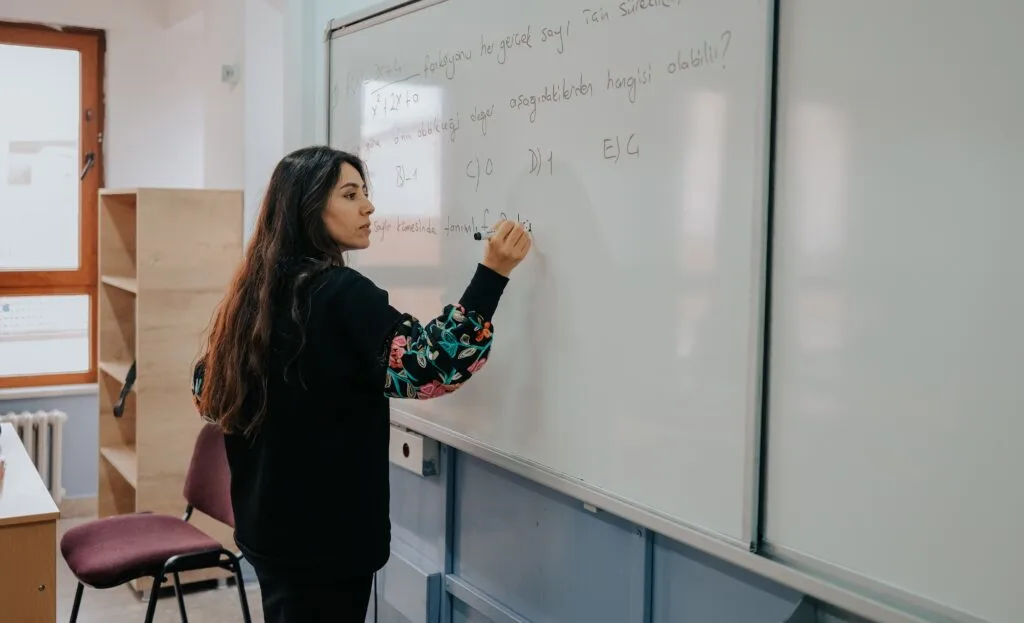Are you in your 30s and considering a career change? Have you ever thought about becoming a teacher in your 30s? It may seem like an intimidating task to switch careers when you are already established in your current profession, but it is possible.
Don’t be scared to take on the transition to a second career. Many people who have done so find making the change incredibly rewarding.
Making the transition into teaching can be surprisingly straightforward and even rewarding. While many have left the path of teaching in the past few years according to education statistics, there are still many benefits to being a teacher. And many find the career path to be desirable.
Because of this mass exodus, there is a need for new teachers. Prospective teachers may find that there are new alternative routes to becoming a teacher in today’s climate.
Whether you are looking to teach in public schools or private schools, becoming a certified teacher in your 30s means you bring life experience to the table.
Having another career first brings a unique perspective to the teaching field. Think of how you can present yourself in a unique way and be even more valuable to your students.
Whether you’re planning on going back to school for certification, want to learn more about what it takes to become a teacher, or just explore career options, this blog post will provide guidance for those looking at starting a new journey as a teacher later in life.
With some research, hard work and dedication – becoming certified could open doors that have been closed for years! Learn from other teachers who have successfully transitioned into their dream profession after 30 with these tips.

Become a Teacher In Your 30s – Where To Start
Understand the qualifications and certifications needed to become a teacher:
Becoming a teacher is a noble profession that requires a great deal of education and training.
To qualify for a teaching position, you typically need to meet the minimum education requirements of having a bachelor’s degree in education, early childhood education, or a related field.
However, some states or school districts may require a master’s degree or additional certification in a specific subject areas. In addition, most states require that you pass a certification exam, such as the Praxis exam, before you can be licensed to teach.
Other qualifications and certifications that may be helpful include experience working with children or teaching experience in a specific subject, such as music or art.
It depends on the district you’ll be in and subjects you are looking to teach whether or not you can take an alternative route to teaching.
So if you’re passionate about making a positive difference in the lives of young people and are willing to put in the work, becoming a teacher could be the perfect path for you.
Think back to your favorite teachers – what did you love the most about them? Let this inspire your teaching style. Successful teachers are ones who enjoy the process.

What Is The Process For Becoming a Teacher?
Becoming a teacher typically involves several steps and requirements.
While the specific process may vary depending on the country and educational system, here is a general overview of the steps involved in becoming a teacher:
- Choose a Teaching Specialization: Determine the subject or grade level you wish to teach. Common specializations include elementary education, secondary education (in specific subjects), special education, and others.
- Earn a Bachelor’s Degree: Obtain a bachelor’s degree in education or in the subject you plan to teach. Some countries require a degree in education specifically, while others may accept degrees in relevant subjects with additional teaching qualifications.
- Complete Teacher Preparation Program: If your bachelor’s degree is not in education, you may need to complete a teacher preparation program, such as a post-baccalaureate program or a master’s degree in education. These programs provide the necessary coursework and practical training to develop teaching skills.
- Gain Teaching Experience: Many teacher preparation programs include a student teaching component, where you work in a classroom under the supervision of an experienced teacher. This provides valuable hands-on experience and allows you to apply your knowledge in a real classroom setting.
- Obtain Teaching Credentials or Certification: Depending on your location, you may need to obtain teaching credentials or certification. This often involves passing examinations, such as a teaching skills test or subject-specific assessments. Some regions may also require a criminal background check or fingerprinting.
- Complete Additional Requirements: In addition to obtaining teaching credentials, there may be other requirements, such as completing first aid or CPR certification, child abuse prevention training, or specific professional development courses.
- Apply for Teaching Positions: Once you have met the necessary qualifications, you can start applying for teaching positions in schools or educational institutions. Prepare your resume, gather your references, and submit applications to schools or through the appropriate hiring channels.
- Interview and Selection Process: If your application is shortlisted, you may be invited for interviews with school administrators or hiring committees. The interview process may include a demonstration lesson or teaching presentation to assess your teaching abilities.
- Continuing Education and Professional Development: Throughout your teaching career, it’s important to engage in ongoing professional development to stay updated on teaching practices and educational trends. This can involve attending workshops, conferences, or pursuing advanced degrees.
It’s worth noting that the specific requirements and regulations for becoming a teacher can vary significantly depending on the country, state, or even the school district.
It’s advisable to research the specific requirements in your desired teaching location to ensure you have a comprehensive understanding of the steps involved.
Because of current teachers changing professionals, there are a lot of options for alternative programs now for a teacher training program. Qualified teachers also have more options as well.

Learn how to prepare for the different certification tests:
Certification tests can be daunting, but with the right preparation, you can give yourself the best possible chance of success.
There are a few steps you can take to get ready for these exams, no matter which certification you’re looking to obtain.
First, make sure you understand the format of the test and what types of questions you’ll be asked. This will help you tailor your study efforts to the material that will be covered.
It’s also a good idea to review any study materials provided by the certifying organization, such as study guides or practice exams.
Finally, set aside dedicated study time and create a schedule that allows you to cover all the necessary material ahead of test day.
With a bit of effort and preparation, you can put yourself in position to pass the certification test with flying colors.
Explore potential job opportunities in your area and research their requirements:
With the world constantly evolving, it’s important to stay ahead of the game when it comes to job opportunities.
Researching potential jobs in your area is a great way to identify what you’re interested in and what qualifications employers are looking for.
Whether it’s a position in healthcare, finance, or retail, taking time to research the requirements can help you obtain that dream job.
Furthermore, understanding what employers are looking for allows for you to tailor your resume and cover letter to best highlight your skills and experience.
By taking the initiative to explore different job opportunities in your area, you’ll be setting yourself up for success in the long run.
Research scholarships or financial aid available for adult learners:
Going back to school as an adult can be both exciting and daunting, especially when considering the financial burden that comes with higher education.
Fortunately, there are many scholarships and financial aid options available specifically for adult learners.
From private organizations to government-funded programs, there are resources out there to help make the pursuit of higher education more affordable.
It’s important to do your research and understand the eligibility requirements and application process for each opportunity. With a little persistence and effort, you might just find the funding you need to pursue your academic dreams.
Develop a budget based on your lifestyle, needs, and income level:
One thing to keep in mind is that you may or may not take a pay cut when you change careers.
It’s important to plan financially for this change in income level.
Managing your finances can be a daunting task, especially when it comes to budgeting. One of the keys to creating a successful budget is understanding your unique lifestyle needs and income level.
A budget helps you prioritize your spending, so you can ensure you’re not overspending in one area while neglecting another. It’s important to take into consideration all your expenses, both fixed and variable, such as housing costs, transportation, food, utilities, and entertainment.
Once you have a clear understanding of your expenses, you can allocate your income accordingly.
Budgeting may seem like a tedious task, but taking the time to develop a budget that fits your lifestyle can make a big difference in achieving your financial goals.

How Can I Change Career Paths To Become a Teacher?
Transitioning to a teaching career from another profession is possible, although it may require additional steps and considerations.
Here are some general guidelines for transitioning to teaching from another career:
- Research Teaching Requirements: Start by researching the teaching requirements in your country or region. Understand the qualifications, certifications, and any specific educational requirements needed to become a teacher. This will give you a clear idea of the steps involved in transitioning.
- Assess Your Transferable Skills: Identify the skills and experiences from your current career that can be transferable to teaching. Teaching requires strong communication, organization, leadership, and problem-solving skills. Reflect on how your current skills can be applied to an educational setting and highlight them during the transition process. Do you know a second language? Consider using that to your advantage as well.
- Complete the Necessary Education or Training: Depending on your qualifications and the requirements of your target teaching position, you may need to pursue additional education or training. This could involve enrolling in a teacher preparation program, such as a post-baccalaureate program or a master’s degree in education. These programs provide the necessary coursework and practical training to develop teaching skills.
- Gain Classroom Experience: If you have limited or no prior experience in a classroom, it can be beneficial to gain some experience before fully transitioning to teaching. Consider volunteering or working as a teaching assistant to get exposure to the classroom environment. This can help you understand the dynamics of teaching and determine if it aligns with your career goals. Student teaching experience on top of your undergraduate degrees can set you apart.
- Network and Seek Mentorship: Connect with professionals in the education field, such as teachers, administrators, or career counselors. They can provide valuable insights, guidance, and mentorship as you navigate the transition process. Attend education conferences, join professional organizations, and engage in online communities to expand your network.
- Obtain Teaching Certification: Investigate the certification requirements for teachers in your region. Depending on your location, you may need to complete specific exams or assessments to obtain teaching certification. Some jurisdictions offer alternative certification routes or programs designed specifically for career changers. Explore these options to streamline your transition process.
- Update Your Resume and Prepare for Interviews: Modify your resume to highlight relevant skills, experiences, and education that align with the teaching profession. Emphasize any transferable skills you possess and any experiences working with children or in education-related roles. Prepare for teaching interviews by researching common interview questions and practicing your responses.
- Consider Substitute Teaching or Part-Time Roles: As you transition into teaching, consider opportunities to gain experience through substitute teaching or part-time roles. This can provide valuable classroom experience, build relationships with educators, and allow you to explore different teaching environments before committing to a full-time position.
Remember, the transition to teaching may require some patience and persistence. It’s important to have a genuine passion for education and a commitment to lifelong learning.
By taking the necessary steps, obtaining the required qualifications, and leveraging your existing skills, you can successfully transition to a teaching career from another profession.

Final Thoughts On Becoming a Teacher in Your 30s
Becoming a teacher in your 30s is a big decision to make, and one that requires careful thought and consideration.
If, after researching the qualifications needed and exploring potential job opportunities, you decide to pursue teaching as a profession, you can create a plan for returning to school. This includes figuring out which certification tests you will need to take and how to best study for them.
Additionally, look into resources for adult learners such as financial aid or scholarships available for those in your demographic.
Lastly, develop a realistic budget based on your lifestyle and income level that will meet both your basic needs and enable you pursue the career path of your choice.
All of these components working together have the potential to help make this big decision not only the right one but also a successful one!
Posts About Life In Your 30s
- Best 225+ Turning 30 Phrases, Wishes, Messages for a 30th Birthday
- 10 Things To Look Forward To In Your 30s
- 10 Best Blogs To Read In Your 30s
- 30 Books to Read In Your 30s
- 50 Inspiring Quotes For Your 30s
- The Ultimate Bucket List For Your 30s
- Turning 30 Poems: 30 Poems For 30th Birthday Wishes
- Turning 30 Humor and Turning 30 Jokes That Will Make You Laugh
- Cheers to 30 Years: How I’m Approaching My Thirties
- How To Deal With Overbearing Parents at 30
- 30th Birthday Party Themes: 36 Ideas To Celebrate in Style
- Gifts For Women In Their 30s
- How To Get My Life Together At 30
- How To Reinvent Yourself At 30
- 50 Movies Every Woman Should Watch In Her 30s
- 200+ Smile Quotes for Instagram to Inspire You
- 30 Great Gifts For Someone Turning 30
- How To Dress In Your 30s: 21 Must-Have Style Pieces
- Being In Your 30s: Everything You Need To Know
- 40 Hairstyles For Women In Their 30s
- Being Broke at 30: What To Do About It
- Starting Over In Your 30s: Where To Go From Here
Career In Your 30s
- Becoming a Lawyer at 30: Is It Too Late?
- Becoming a Nurse at 30: 10 Career-Changing Tips
- Becoming an Actuary at 30: Is It Too Late?
- Career Change at 35 Ideas To Inspire You
- Career Change at 30: 15 Must-Know Tips
